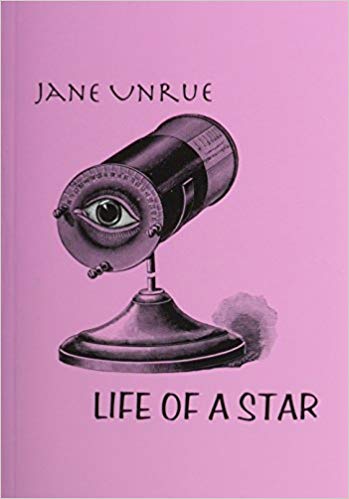“I wish I had a better story for you,” confides the unnamed narrator a third of the way into Jane Unrue’s new miniaturist novel, though there’s hardly cause for so modest a claim. With just over one hundred pages, some of them hosting no more than a wee phrase or the clarion burst of a sentence, and most of them giving out well shy of the bottom margins, the novel, though slender, is emotionally thorough, dense but not crammed, and unnoisily original in the bloodbeat and quiver of its prose.
Unrue writes intricate, ribbony sentences that often reel themselves into the safeholds of eccentrically stacked, unindented paragraphs as lyrically loaded as Joseph Cornell boxes. Sometimes these gracile ribbons get snipped short of tidying grammatical resolution; the narrator, we learn, is in fact something of a mean whiz with a scissors and a knife.
Nearing (or already well submerged in) the loneliness and lovelessness of early middle age, she’s the daughter of a washed-up actress, and though not officially an actress herself, she has discovered the only certain way to insert herself acutely into experience: to regard every instant as an opportunity for performance, for representing herself rather than entirely being herself (and whatever further self-discovery that might finally require). So confused is her life with theatricality that rain falls “as if it had been yanked from buckets poised on rafters up above,” and stage directions are tucked into her thoughts, slipcased between parentheses—“(Full-body modesty)”; “(Mild eyebrow tip)”; “(single-handed heart-grip).” “Since there is artificiality in mere utterance,” she’s convinced she “must live the words.”
But life, as she practices the living of it, amounts to casting herself into an ever-narrowing repertoire of melancholy enactments unfolding mostly in the galleries of a museum (through which, profusely ruffled and garbed in preposterous layerings of underskirts and other costumic outlandishments, she kills hour after hour skulking coquettishly, hoping to pry one or another man loose from an alarmed wife) and by the fountain in a public garden, where she suffers little more than half a dozen rendezvous with, one gathers, her only lover ever, a worldly man who is apparently married (it’s a furtive, futureless courtship). From these outings she returns, unconsoled, to the ticktock isolations of her rented room, where she spinsterishly busies herself with embroidering a bumblebee onto a pillowcase (her goal, fittingly enough, to arrest the buzzy wingbeats into a stitchy stillness) and broods over her rooming-house childhood, during which the arrival of an alluring slip of a girl with dollhouse manners and a goshing vocabulary left her feeling upstaged, driving her to rages of violent jealousy. Her mother admonishingly declared, of all things, “I don’t know who you think you’re fooling with these histrionics.”
But the narrator is scarcely one for foolery. Three-quarters of the way through her account, she brashly encapsulates the desperate program of her life in a dizzying, self-aggrandizing, one-sentence manifesto: “The one who stimulates attraction to herself by molding her complexities to meet a given situation and by demonstrating, at the same time, the effect her having on the situation has upon her own self, wins.” By now, though, she has been rehearsing herself further and further away from the heart-quickening enmeshments of life and deeper into claustral despair. Small wonder, then, that images of graves and buried girls figure so tormentingly in her imagination; it’s as if she wishes to be pulled alive from the burial pit of her part-playing self.
Inviting itself to be read as a phantom refinement of the celebrity-autobiography genre, Life of a Star, direly melodic and winsomely elliptical, belongs in that rich vein of contemporary fiction that forgoes narrative overrun, overmuchness of dialogue, and reportorial sprawl, and instead dispenses itself in slivery, pivotal declarations and gleaming summation. It’s a novel cored to the climactics, the crucialities—and it’s entirely a perfection.





